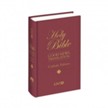2 Chronicles 9:13-29
Good News Translation
King Solomon's Wealth(A)
13 Every year King Solomon received over twenty-five tons of gold, 14 in addition to the taxes paid by the traders and merchants. The kings of Arabia and the governors of the Israelite districts also brought him silver and gold. 15 Solomon made two hundred large shields, each of which was covered with about fifteen pounds of beaten gold, 16 and three hundred smaller shields, each covered with about eight pounds of beaten gold. He had them all placed in the Hall of the Forest of Lebanon.[a]
17 The king also had a large throne made. Part of it was covered with ivory and the rest of it was covered with pure gold. 18 Six steps led up to the throne, and there was a footstool attached to it, covered with gold. There were arms on each side of the throne, and the figure of a lion stood at each side. 19 Twelve figures of lions were on the steps, one at either end of each step. No throne like this had ever existed in any other kingdom.
20 All of King Solomon's drinking cups were made of gold, and all the utensils in the Hall of the Forest of Lebanon were of pure gold. Silver was not considered valuable in Solomon's day. 21 He had a fleet of ocean-going ships sailing with King Hiram's fleet. Every three years his fleet would return, bringing gold, silver, ivory, apes, and monkeys.
22 King Solomon was richer and wiser than any other king in the world. 23 They all consulted him, to hear the wisdom that God had given him. 24 Each of them brought Solomon gifts—articles of silver and gold, robes, weapons, spices, horses, and mules. This continued year after year.
25 (B)King Solomon also had four thousand stalls for his chariots and horses, and had twelve thousand cavalry horses. Some of them he kept in Jerusalem and the rest he stationed in various other cities. 26 (C)He was supreme ruler of all the kings in the territory from the Euphrates River to Philistia and the Egyptian border. 27 During his reign silver was as common in Jerusalem as stone, and cedar was as plentiful as ordinary sycamore in the foothills of Judah. 28 (D)Solomon imported horses from Musri[b] and from every other country.
Summary of Solomon's Reign(E)
29 The rest of the history of Solomon from beginning to end is recorded in The History of Nathan the Prophet, in The Prophecy of Ahijah of Shiloh, and in The Visions of Iddo the Prophet, which also deal with the reign of King Jeroboam of Israel.
Read full chapterFootnotes
- 2 Chronicles 9:16 A large ceremonial hall in the palace, probably so called because it was paneled in cedar.
- 2 Chronicles 9:28 Probable text (see 1.16) Musri; Hebrew Egypt.
Good News Translation® (Today’s English Version, Second Edition) © 1992 American Bible Society. All rights reserved. For more information about GNT, visit www.bibles.com and www.gnt.bible.
Bible Gateway Recommends











